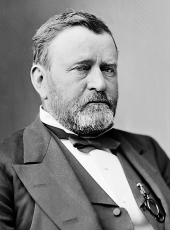To the House of Representatives:
The act making appropriations for sundry civil expenses of the Government for the fiscal year ending June 30, 1877, is so defective in what it omits to provide for that I can not announce its approval without at the same time pointing out what seems to me to be its defects. It makes but inadequate provision for the service at best, and in some instances fails to make any provision whatever.
Notably among the first class is the reduction in the ordinary annual appropriations for the Revenue-Cutter Service, to the prejudice of the customs revenue.
The same may be said of the Signal Service, as also the failure to provide for the increased expense devolved upon the mints and assay offices by recent legislation, and thus tending to defeat the objects of that legislation.
Of this class also are public buildings, for the protection, preservation, and completion of which there is no adequate appropriation, while the sum of $100,000 only is appropriated for the repairs of the different navy yards and stations and the preservation of the same, the ordinary and customary appropriations for which are not less than $1,000,000.
A similar reduction is made in the expenses for armories and arsenals.
The provision for the ordinary judicial expenses is much less than the estimated amount for that important service, the actual expenditures of the last fiscal year, and the certain demands of the current year.
The provision for the expenses of the surveys of public lands is less than one-half of the usual appropriation for that service and what are understood to be its actual demands.
Reduction in the expenditures for light-houses, beacons, and fog stations is also made in similar proportion.
Of the class for which no appropriation is made, among the most noticeable, perhaps, is that portion of the general expenses of the District of Columbia on behalf of the United States, as appropriated in former years, and the judgments of the Court of Claims. The failure to make a reasonable contribution to the expenses of the nation's capital is an apparent dereliction on the part of the United States and rank injustice to the people here who bear the burdens, while to refuse or neglect to provide for the payment of solemn judgments of its own courts is apparently to repudiate. Of a different character, but as prejudicial to the Treasury, is the omission to make provision to enable the Secretary of the Treasury to have the rebel archives and records of captured and abandoned property examined and information furnished therefrom for the use of the Government.
Finally, without further specification of detail, it may be said that the act which in its title purports to make provision for a diverse and greatly extended civil service unhappily appropriates an amount not more than 65 per cent of its ordinary demands.
The legislative department establishes and defines the service, and devolves upon the Executive Departments the obligation of submitting annually the needful estimates of expenses of such service. Congress properly exacts implicit obedience to the requirements of the law in the administration of the public service and rigid accountability in the expenditures therefor. It is submitted that a corresponding responsibility and obligation rest upon it to make the adequate appropriations to render possible such administration and tolerable such exaction. Anything short of an ample provision for a specified service is necessarily fraught with disaster to the public interests and is a positive injustice to those charged with its execution.
To appropriate and to execute are corresponding obligations and duties, and the adequacy of the former is the necessary measure of the efficiency of the execution.
In this eighth month of the present session of Congress--nearly one month of the fiscal year to which this appropriation applies having passed--I do not feel warranted in vetoing an absolutely necessary appropriation bill; but in signing it I deem it a duty to show where the responsibility belongs for whatever embarrassments may arise in the execution of the trust confided to me.
U. S. GRANT.
Ulysses S. Grant, Special Message Online by Gerhard Peters and John T. Woolley, The American Presidency Project https://www.presidency.ucsb.edu/node/204637

